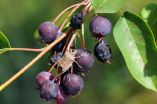INFORMATION:
Researchers define unique group of high-risk lymphoma patients
2015-06-29
(Press-News.org) The goal for many cancer patients is to reach the five-year, disease-free mark, but new research from UR Medicine's Wilmot Cancer Institute suggests that two years might be a more practical survival goal for people with follicular lymphoma.
The difference underscores the fact that about 20 percent of follicular lymphoma patients consistently experience their disease coming back within two years of being treated with the latest therapies--despite the fact that most follicular lymphoma patients can expect to live 20 years.
People who relapse early may have a disease with distinctly different biology, said Carla Casulo, M.D., a Wilmot oncologist and assistant professor of Medicine at the University of Rochester, who led the study. The findings are published online by the Journal of Clinical Oncology and will be accompanied by an editorial in JCO's print edition later this summer.
Usually this type of blood cancer is slow-growing, with long periods of remission followed by late relapses and more treatment. Until now, it was not scientifically confirmed that the patients in the 20-percent group also have very poor survival outcomes; 50 percent of these patients die in five years.
Follicular lymphoma is the second most common non-Hodgkin lymphoma, affecting approximately 15,000 people a year in the United States. The Wilmot study recommends that early relapse should be carefully considered when oncologists and patients are making decisions about treatment.
"Through research we have confirmed that all relapsed patients are not equal, and therefore should not be approached the same at diagnosis nor at the time of relapse in terms of therapies," Casulo said. "It will be critical to predict who is most likely to relapse early. We believe that targeted sequencing or gene-expression profiling will be important to understanding how to improve the outcomes of this group."
Investigators, including co-author Jonathan W. Friedberg, M.D., director of the Wilmot Cancer Institute, came to their conclusions after analyzing data from 588 patients with stage 2-4 follicular lymphoma and confirming the findings in an independent patient cohort.
The research has already been presented as a talk at the American Society of Hematology (ASH) annual meeting and highlighted as one of the most important abstracts presented. The National Cancer Institute is also starting to develop clinical trials for this high-risk, early-relapsing subgroup of follicular lymphoma patients.
ELSE PRESS RELEASES FROM THIS DATE:
Who takes care of whom? Surprising new evidence
2015-06-29
NEW YORK (29 June 2015) -- There has been much recent discussion in the press of the plight of the so-called "sandwich generation," that is, adults who are responsible for the care of children as well as aging parents. The need for simultaneous childcare and eldercare is a reality that can limit families'--particularly women's--opportunities for paying work.
A new study by social scientists Emilio Zagheni and Denys Dukhovnov for the first time drills down into US statistics about who is providing this care, and who is receiving it. The study found that in 2012, adults ...
After Ebola, understanding health care needs among rural Liberians
2015-06-29
WASHINGTON (June 29, 2015) -- As Liberia rebuilds a health care system decimated by the 2014 Ebola outbreak, understanding precisely how far citizens live from health facilities and its impact on seeking care can help shape new strategies to improve health care delivery and reduce geographic disparities.
A new examination of remoteness as a barrier to health care, published online today in the Journal of Global Health, notes that most surveys and policy documents categorize families as living either in an urban or rural setting, and this dichotomy can mask disparities ...
Talk is cheap: New study finds words speak louder than actions
2015-06-29
When it comes to the art of persuasion, you can attract more followers if you turn conventional wisdom on its head and stress what you like, not what you do.
A new study, to be published in an upcoming issue of the Journal of Personality and Social Psychology, finds that people are more likely to conform to others' preferences than conform to others' actions. In other words, people want to like what others like, but they want to have or do what others don't have or don't do.
In the study, "Words Speak Louder: Conforming to Preferences More Than Actions," by University ...
Understanding why animals are healthy offers path to precision medicine
2015-06-29
DURHAM, N.C. - Researchers at Duke University School of Medicine and Brigham and Women's Hospital, Harvard Medical School have identified a mechanism that explains why some mutations can be disease-causing in one genome but benign in another.
In a study appearing June 29, 2015, in the journal Nature, the researchers compared thousands of human disease-causing mutations with the analogous sequences of some 100 animal species. They discovered non-human genomes carrying mutations that cause severe disease in humans, yet were benign in the animals.
Although generally in ...
Stink bugs have strong taste for ripe fruit
2015-06-29
The brown marmorated stink bug has a bad reputation. And for good reason: every summer, this pest attacks crops and invades homes, causing both sizable economic losses and a messy, smelly nuisance--especially in the eastern United States. A new study by entomologists at the University of Maryland shows that these pests, known simply as stink bugs, have a strong preference for ripe fruit. Moreover, stink bugs track their favorite fruits throughout the growing season in an effort to maximize their access to food.
The study, published online June 25, 2015 in the Journal ...
New family of small RNAs boosts cell proliferation in cancer
2015-06-29
PHILADELPHIA -- Since their discovery in the 1950s, transfer RNAs (tRNAs) have been best known for their role in helping the cell make proteins from messenger RNA templates. However, recent studies have led to a previously-unsuspected concept that tRNAs are not always the end product; namely, they further serve as a source of small RNAs. Now researchers have discovered a new species of tRNA-derived small RNAs that are produced only in hormonally-driven breast and prostate cancers, and which contribute to cell proliferation. The results will be published online the week ...
Genes responsible for increased activity during the summer
2015-06-29
The warm temperature on a summer's day is often a time for relaxing, but researchers from the University of Leicester have suggested that a 'thermosensory' gene could be responsible for changes in behaviour in different climates.
The researchers from the University of Leicester's Department of Genetics have explored how the biological clock can be affected by the environment by examining the fruitfly Drosophila melanogaster, which shows 24 hour biological cycles and is used as a model organism for studies into human rhythms.
Like many humans, the fly has a 'siesta' ...
Atmospheric mysteries unraveling
2015-06-29
It's been difficult to explain patterns of toxic mercury in some parts of the world, such as why there's so much of the toxin deposited into ecosystems from the air in the southeastern United States, even upwind of usual sources.
A new analysis led by researchers at the University of Colorado Boulder shows that one key to understanding mercury's strange behavior may be the unexpected reactivity of naturally occurring halogen compounds from the ocean.
"Atmospheric chemistry involving bromine and iodine is turning out to be much more vigorous than we expected," said ...
OU professor developing vaccine to protect global communities from malaria
2015-06-29
A University of Oklahoma professor studying malaria mosquito interaction has discovered a new mosquito protein for the development of a new vaccine that is expected to stop the spread of the disease in areas where it is considered endemic. Malaria is transmitted by mosquitoes, and it infects millions of people in Africa, Asia and South America every year, causing a global health crisis. In addition to the local populations, U.S. military personnel stationed in these areas and travelers to these malaria-prone areas are at risk of becoming infected.
Jun Li, assistant ...
A deep, dark mystery
2015-06-29
UC Santa Barbara geologist Jim Boles has found evidence of helium leakage from the Earth's mantle along a 30-mile stretch of the Newport-Inglewood Fault Zone in the Los Angeles Basin. Using samples of casing gas from two dozen oil wells ranging from LA's Westside to Newport Beach in Orange County, Boles discovered that more than one-third of the sites -- some of the deepest ones -- show evidence of high levels of helium-3 (3He).
Considered primordial, 3He is a vestige of the Big Bang. Its only terrestrial source is the mantle. Leakage of 3He suggests that the Newport-Inglewood ...


